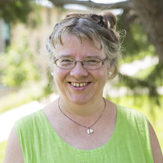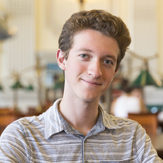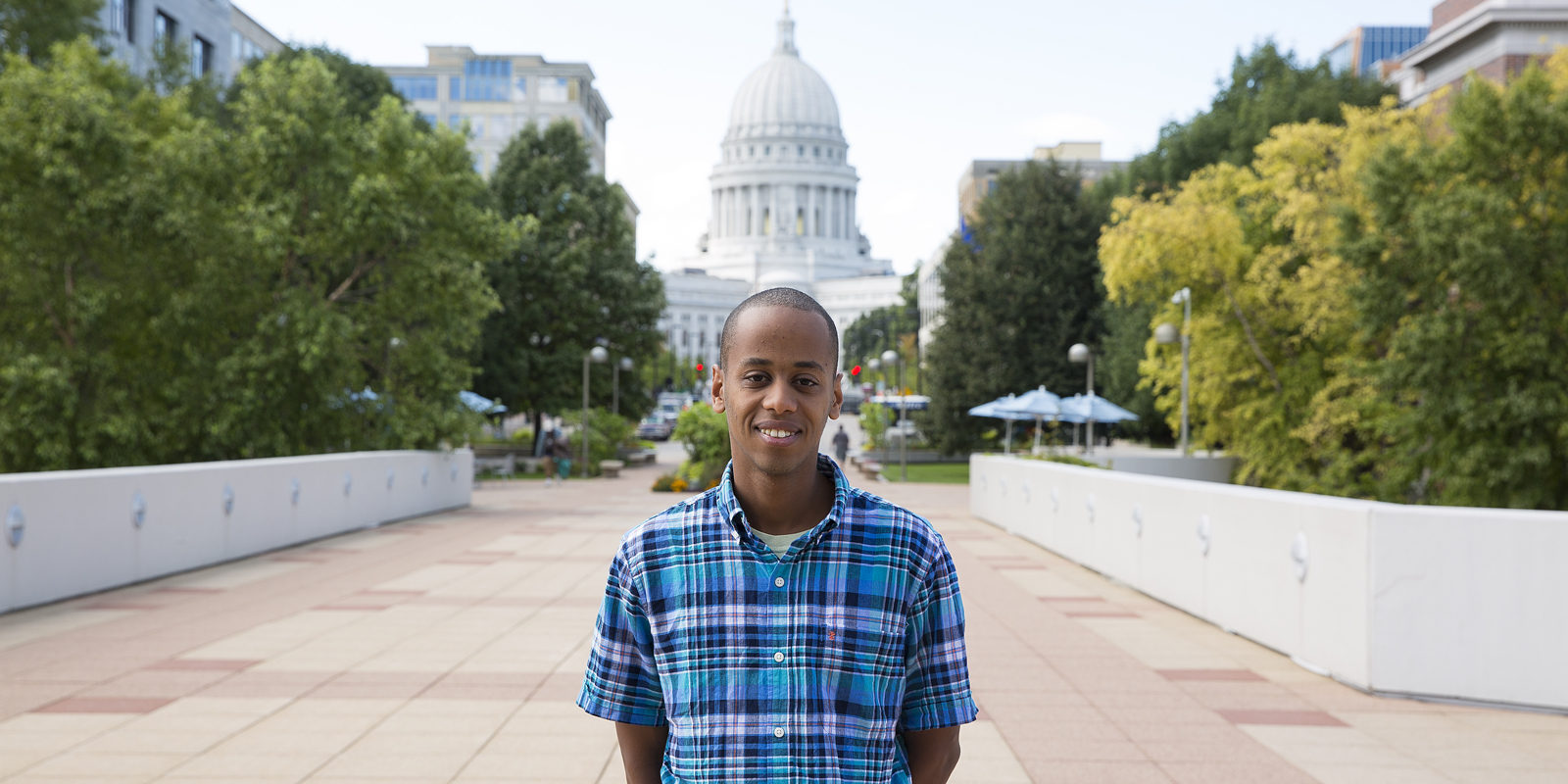For L&S students who are curious and driven, there’s no limit to where the Honors Program can take them.
Negassi Tesfamichael spent his summer criss-crossing the country, traveling to Cleveland and Philadelphia for the Republican and Democratic national conventions. There, he filed news stories for UW’s Daily Cardinal and consulted with political science professor Byron Shafer, who has been attending the conventions since 1980. Tesfamichael worked with Shafer during a research apprenticeship his sophomore year, and now the professor is assisting him with his senior thesis on the importance of the time-span between when candidates announce and their primaries.
For two days in July, Sam Gee tucked away in the archives at Harvard University, poring over papers and letters written by William James and peeking at notes the late 19th century psychologist, philosopher and professor had scrawled in the margins of books. The experience will bring invaluable insights to Gee’s senior thesis, which investigates the early history of the psychology of religion.
These are just two examples of the ways students can enrich and intensify their experience through the College of Letters & Science Honors Program.
More than 1,300 L&S students participate in the Honors Program each year. They take smaller honors classes and incorporate special projects into non-honors courses, work more closely with professors, pursue research and thesis writing, obtain scholarships and grants and receive attention, support and guidance from honors advisors. The program also connects them with other students who are as motivated as they are, creating a like-minded community within a broad campus.
Always Evolving to Push Students
In 1958, the L&S Honors Program was created to meet students’ demands for the opportunity to “delve more deeply” into complex subjects. Since 1997, students have had the choice of three different degree paths: Honors in the Liberal Arts, Honors in the Major and Comprehensive Honors, which is a combination of the two.
More recently, the program shifted from being offered only to incoming students with the highest grade point averages to being open for all students to apply. It’s a strategic change, says director Sabine Gross, to attract students who are ready for challenges and opportunities.

We don’t just want grades and academic performance. We want motivation and students who want to challenge themselves.
“We don’t just want grades and academic performance,” Gross says. “We want motivation and students who want to challenge themselves.”
Once admitted to the Honors Program, students are expected to maintain a GPA of 3.3 or higher — a benchmark lower than at honors programs in some other schools. That’s also on purpose, Gross says, so students can take risks and try new courses instead of sticking with “safe” courses that will keep a certain GPA intact. If students don’t stretch and try out topics that pique their interests, they won’t grow and they’ll miss opportunities to find where their true passions lie, she adds.
Guiding and Connecting
Of course, many students appreciate some help discovering those passions, and that’s where the Honors Program advising team comes in.
Advisors guide students in choosing classes, field questions at any time during the semester, help connect them with faculty and assist in applying for grants and apprenticeships. The Honors Program offices in the Washburn Observatory are a one-stop shop for almost anything a student needs.
Jacqui Guthrie, associate director of academic services, says the program takes a “meet the students where they are” approach to advising. She helps them with practical needs but also guides them in goal-setting and discovering the where their “skills, interests and values” intersect. “I draw a lot of Venn diagrams,” she says.
Sophomore Teddy Powers has appreciated the guidance she’s received through Honors advising, and she paid it forward this summer, helping incoming students navigate course selection as a peer advisor at SOAR.
The neurobiology and religious studies major from Middleton, Wisconsin, also enjoys the community-building aspects of the program. From a fall kick-off picnic to social get-togethers throughout the year to Honors graduation receptions, there are lots of ways to connect. And spending time with peers who are equally engaged in their education is important, Powers says.
“It’s a great way to make a big university really small,” she says.
Access Creates Opportunities
When Gee, a senior from Madison, was thinking about where to go to college, he considered smaller liberal arts schools but worried they wouldn’t offer enough variety or access to research. UW-Madison and the Honors Program became an ideal fit because the program has allowed him to take smaller classes, conduct his own research and work closely with faculty.
In fact, it was Eric Carlsson, a teaching associate in the history department, and his courses on intellectual and religious history that sparked Gee’s interests.

It really opened up worlds for me. I like the way of looking at history through big ideas, and big ideas through history.
“It really opened up worlds for me,” he says. “I like the way of looking at history through big ideas, and big ideas through history.”
Staff at the Honors Program helped Gee pursue a cross-disciplinary thesis and a summer honors thesis research grant to access the archives at Harvard.
“What I like about the Honors Program is it lets you be more individualistic,” he says. “It lets you work really closely with faculty and it lets them help you narrow your interests.”
Like Gee, Giselle Blocker also desired access to faculty and appreciates that the Honors Program “opened the door to having that experience.”
The Glenbrook, Illinois, native had the opportunity to work with Susan Johnson on a research paper based on a book the professor of history and Chican@ and Latin@ Studies had written. The process was tough but it pushed Blocker to become a stronger writer. “It only motivated me to do better,” she says.
Blocker initially assumed the history degree she’s pursuing — along with a certificate in Chican@ and Latin@ Studies — would lead to law school. But through the Honors Program, she’s focusing on developing a wide range of skills and feeling confident about what her liberal arts training can bring to the working world. She plans to pursue a career in management consulting in the business sector.
“I’m studying the past to improve the future,” she says.
Tesfamichael, too, recognizes the impact the Honors Program has had on how he envisions his future. The junior from the Milwaukee area says the program’s encouragement to push out of comfort zones and think critically and thoughtfully about what he’s learning has left him open to several exciting possibilities after graduation.
“It helps build your arsenal in what you can do with your education,” he says.
Honors Program By the Numbers
1960: The year the L&S Honors Program began.
7: The percentage of L&S students who are currently in the Honors Program.
250: The approximate number of students who graduate with Honors degrees each year.
83: The percentage of Honors Program graduates who go on to attend graduate or professional school the following year.


